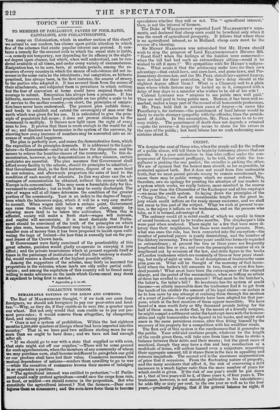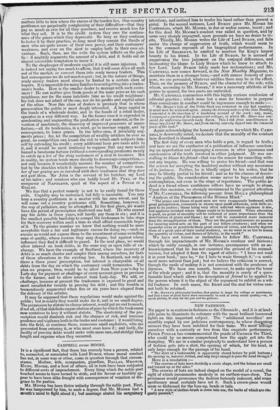CREDIT.
Wa despise the cant of those who, when the people call for the reform of a public abuse, will tell them to begin by reforming abuses that are private. It is a poor satisfaction to him who suffers under the con- sequences of Government profligacy, to be told, that while the tax- gatherer is picking the one pocket, the swindler is picking the other. We are of opinion that the honest man should, as far as possible, be protected against both. But it does not result from this undeniable truth, that we must permit private wrong to remain unredressed, be- cause there may be public wrongs which we cannot redress. !‘,Ve, therefore, owe no apology for pointing the attention of our readers to a system which works, we really believe, more mischief in the course of the year than the Chancellor of the Exchequer and all his employje --we mean the credit system. In laying down the principles of the "Cheap Clubs," we dwelt at considerable length on the great in- jury which credit inflicts on the ready. money customer, and we shall not recur to this part of the subject. What we wish at present to no- tice, is the injury it inflicts on,the tradesMan, and on the persons who take, as it is termed, advantage of it. The ordinary credit (it is retail credit of which we speak) in times of sound business, used to be twelve months. The shopkeeper's bills were paid when rendered. There might be ' a few that were more di- latory than their neighbours, but those were marked persons. Now, what was once the rule, has been converted into the exception—the number of punctual payers is yearly diminishing, and the number of the dilatory increasing. Two or three years' credit was formerly regarded as extraordinary ; at present the two or three years are frequently lengthened into five or six; and even the prescriptive number of six is lengthened out by evasions of the law, and debts figure in the books of London tradesmen which are nominally of three or four years' stand- ing, but really of eight or nine. In all descriptions of business the same plan goes on. What will be thought of the economy of that house- hold where the hatter's bill amounts to two, three, or even five hun- dred pounds? What must have been the extravagance of the original charge, and the period of the accumulation, when so trifling an article of dress has swelled to such an amount? What must be the butcher's, the baker's, the tailor's bill ? So inveterate has the system of credit become—so utterly impossible does the tradesman find it to get from the hands of his creditor the amount of his legal claims—so certain is he to lose caste by any attempt at realizing them through the medium of a court of justice—that expedients have been adopted for that pur- pose, which at the first mention of them appear incredible. We have heard of a man worth forty or fifty thousand pounds failing for the half of these sums, in order that, by the means of a friendly assignee, he might compel a settlement under the bankrupt-laws with the honour- ables and right honourables who figured in his books, and might start anew in the same pernicious course, after thus fitting himself by the recovery of his property for a competition with his wealthier rivals. The first evil of this system is the carelessness that it generates in the public. Your cdld and cautious people, whatever be the length of the credit given them, will take care from time to time to strike a balance between their debts and their means ; but the great mass of mankind, though they may have a dim and hazy recollection of a multitude of items, will seldom hazard even a conjecture respecting their aggregate amount, till it stares them in the face in appalling and ruinous magnitude. The second evil is the enormous augmentation of price that it occasions. From the fluctuating nature of property, and the many accidents that affect it, the risk of recovering a debt increases in aimuch higher ratio than the mere number of years for which credit is giten. If the risk of one year's credit be put down as 1, that of two years will be 2, of three years'4, of four years 8. The tradesman, however, is not minutely particular in his calculations ; he adds fifty or sixty per cent, to the one year as well as to the four years,—prudently judging, that if the general balance be right, it matters little to him where the excess of the burden lies. Our country gentlemen are perpetually complaining of their difficulties—that they pay as much as ever for all they purchase, and receive much less for what they sell. It is to the credit system they owe the continu- ance of the prices which they deprecate. So long as they continue to foster it by their practice, so long must they remain the thralls of men who are quite aware of their own power, and their customers' weakness, and ever on the alert to employ both to their own ad- vantage. Such, then, are the evils the system inflicts on the pub- lie: it mightily augments the amount of a debt, and it holds out an almost irresistible temptation to incur it. To the shopkeeper of moderate capital it is still more injurious. It is indeed not saying too much to affirm, that it will soon drive all such out of the market, or convert them into ready money traders. This last consequence we do not much regret ; but, in the nature of things, ready money traders must always be limited to a certain class of buyers. It is impossible for many families to avoid getting into a trades- man's books. How is the smaller dealer to manage with such custo- mers? He can neither give them goods at the same price as his cash neighbour, nor for the same indefinite time as his credit neighbour: his risk does not admit of the one, nor do his profits and capital admit of the other. Now this class of dealers is precisely that in whose preservation the public is most deeply interested. A large capital in the hands of a wholesale dealer, and in the hands of a retail dealer, operates in a very different way. In the former case it is expended in accelerating and augmenting the production of raw material, in the in- vention of machinery, the discovery of improved processes of mann- facture,—all its tendencies, in a word, go to increase supply, and by consequence, to lower prices. In the latter case, it invariably aug- ments prices ; for, let the competition of wealthy retailers be ever so great, no competition can lessen the risk to which each subjects him- self by extending his credit ; every additional hour pro tanto adds to it, and it would be most irrational to suppose that any man would hazard a handsome fortune (without a corresponding premium) merely to catch up a few of the stray customers of a rival in business. But in reality, no system tends more directly to discourage competition,— not only because it wonderfully narrows the number of competitors, but by the shackles which it imposes on buyers. The greater num- ber of our gentry are so involved with their tradesmen that they dare not quit them. Sir John is the servant of his butcher, my Lord of his tailor; and senators who can boldly beard Mr. PEEL or the conqueror of NAPOLEON, quail at the aspect of a STULZ or a GIBLET.
We fear that a perfect remedy is not to be easily found for these evils. Cupidity may be restrained, but folly is incurable. You may bray a country gentleman in a mortar with his own wheat, and he will come out a country gentleman still. Something, however, in the way of palliation, may be attempted, Li the first place,,we would have the period of prescription shortened one half: fre.wbo cannot pay his debts in three years, will hardly pay them in six; and it is the smallest possible hardship to compel the tradesman to take steps for their recovery within such a time as shall afford reasonable hopes of it. To the greater number we know that nothing would be more acceptable than a fair and legitimate excuse for doing so,—such an excuse as would not expose them to the resentment of some swindling man of quality, whose custom they may despise, but against whose influence they find it difficult to guard. In the next place, we would allow interest on book debts, in the same way as upon bills of ex- change. We have the example of Scotland, where the recovery of debts is so much shorter and simpler than among ourselves, for both of these alterations in the existing law. In Scotland, not only is there a three years' prescription, but interest is chargeable on all debts from the day on which the customary credit terminates. The plan we propose, then, would be to allow from New-year's-day to Lady-day for payment or challenge of every account given in previous to the former, and to allow interest from Lady-day. We add, or challenge, because at present the tradesman is exposed to great and most uncalled-for trouble in proving his debt; and this trouble is tremendously augmented when five or six years have elapsed from the delivery of the articles. It may be supposed that these regulatiOns would make against the public ; but in reality they would make for it, and in no small degree. The permission by statute to charge interest, would put an end to much, zf not all, of that indefinite augmentation of price by which the tradesman inow contrives to levy it without statute. The shortening of the pre- scription would diminish risk and the charges of risk, and increase prudence and vigilance both in the trader and customer; it would bring into the field, or continue there, numerous small capitalists, who are prevented from entering it, or who must soon leave it ; and lastly, the facihty of proving debts would make suits more rare, and abridge their iength and expense when they occurred.



































 Previous page
Previous page